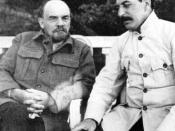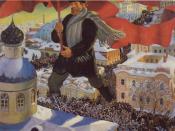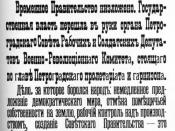The policies of war communism and the New Economic Policy (NEP) had a great impact on both the peasantry and the proletariat. Both policies were a desperate attempt to preserve the revolution and this is greatly reflects the reasons why some groups were advantaged and why others were disadvantaged.
War communism was implemented as a result of the civil war. Historians such as Maurice Dobb, E. H. Carr, and Stephen Cohen -- have interpreted war communism as a short-term expedient imposed on the Bolsheviks by the emergency demands of civil war and foreign intervention. According to this version, the system was never intended to last into normal peacetime conditions and had no special ideological significance. While this has since become "the standard account," several well-informed economists writing in the 1920s, such as Boris Brutzkus and Leo Pasvolsky, viewed war communism in a much more ideological light -- as an attempt to realise Marx' anti-market socialist or communist utopia.
The features of war communism were that peasant land was seized and then nationalised, however the peasant's control. As insufficient grain was reaching the cities the government introduced grain requisition, excess food was seized with Cheka support, it couldn't be sold for a profit. Large scale businesses were nationalised without compensation; this was extended to all business with more than ten people by 1918. All private trade was abolished, and the government controlled food with ration cards and workers were paid through food rations. Workers were told when and where to work, often working up to ten hours a day, and strikes became illegal.
The impact of War Communism was great on both the peasantry and the proletariat. Most peasants were prepared to burn their crops and kill their livestock rather than hand them over to the Cheka, however the dire consequences...



Execellent
You covered all the main points in that time frame with out getting political. I think you did a great job explaining NEP and the events surrounding it. Great job.
4 out of 4 people found this comment useful.